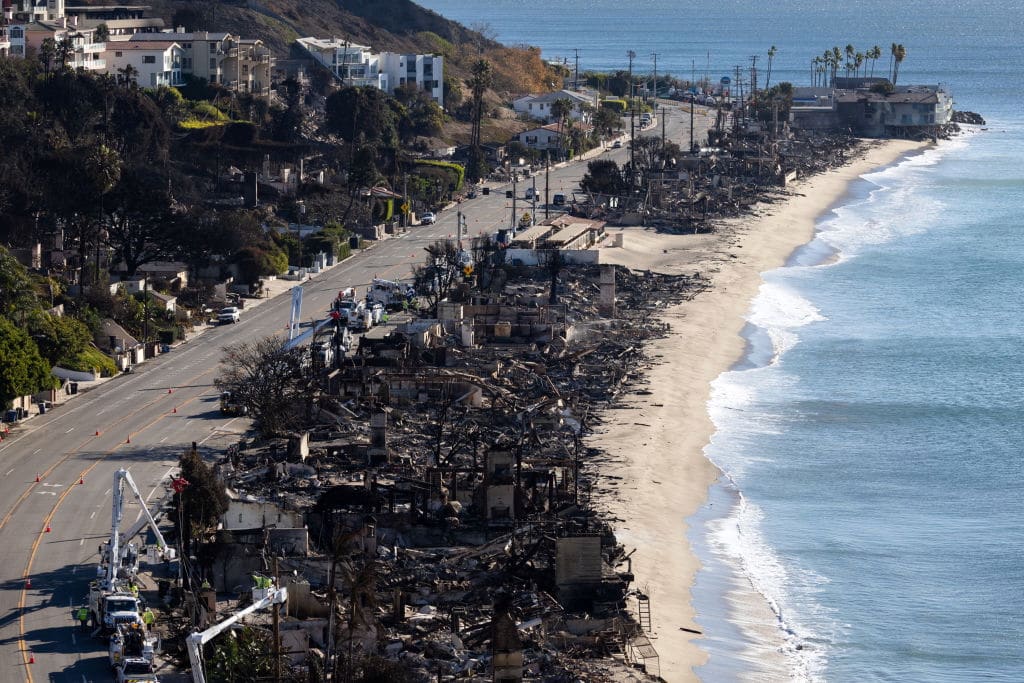This post was originally published on Eco Watch
Survivors of the deadly Los Angeles wildfires are calling for lawsuits and policies to hold those most responsible for global climate disasters accountable, reported The Guardian.
Increasing evidence shows that oil and gas companies have known for decades that fossil fuels are the cause of global heating, but they have continued to market their products while spreading doubt about climate change.
“It is hard to properly express how much was lost,” said Palisades resident Danielle Havanas, whose home was destroyed by last week’s fire, as The Guardian reported. “How do you communicate the value of your deceased mom’s journal from 1981 when she was pregnant with you?”
University of California, Los Angeles, climate scientists have already concluded that the climate crisis was most likely the cause of a quarter of the dry conditions that fueled the rapid spread of the fires.
“[I]t should not continuously fall in us to address the consequences of big oil’s negligence,” said Altadena neighborhood resident Sam James, whose grandfather lost his home in the Eaton fire. “They must take responsibility for the harm that they’ve caused, pay reparations to the affected communities who lost their homes and businesses, and take immediate steps to mitigate further damage.”
California and other states, along with some cities, have brought lawsuits to hold big oil accountable and force them to foot the bill for damages.
“We’re already paying for big oil’s climate destruction, not just with money, but with our lives, so that’s why we need our own climate superfund bill,” said Clara Vondrich, senior policy counsel at nonprofit Public Citizen, of a new version of legislation originally considered by California last year.
On Thursday morning, dozens of climate activists with Sunrise Movement LA protested outside a Phillips 66 oil facility, while 16 demonstrators stormed the Lubricant Terminal’s office building, reported the Los Angeles Times.
Sunrise Movement LA is demanding that oil companies “pay up” to help with wildfire relief and support the state’s clean energy transition.
“Fossil fuel CEOs are responsible for the destruction that is happening right now in Los Angeles,” said 18-year-old Simon Aron, a volunteer with Sunrise Movement and action lead for the protest, as the Los Angeles Times reported. “They are responsible for the fact that me and my neighbors had to evacuate our homes, that we still can’t drink our water.”
Police escorted some of the demonstrators out, but no arrests were made.
“The group that was inside decided to step out,” said Kidus Girma, Sunrise Movement national organizer, as reported by The Los Angeles Times. “The plan is to continue holding space and seeing if other possible occupations begin in the state.”
Sunrise Movement LA planned to keep protesting at the facility through Thursday, until their demands were met or the CEO of Phillips 66 agreed to meet with them.
According to fire experts, Southern California wildfires are becoming more destructive for multiple reasons, including increased development in high-risk areas, as well as a “feedback loop” where native plants don’t have enough time to regrow between fires, which opens the land for more flammable, fast-growing invasive vegetation to spring up.
Following the Eaton and Palisades fires, bipartisan leaders criticized city officials for problems with water pressure and lack of preparedness.
At least 25 people have died in the fires, which left 23 still missing, burned over 27,000 acres and are not yet 100 percent contained.
The post LA Residents Say Fossil Fuel Industry Needs to ‘Pay Up’ for Damage From Wildfires appeared first on EcoWatch.





0 Comments